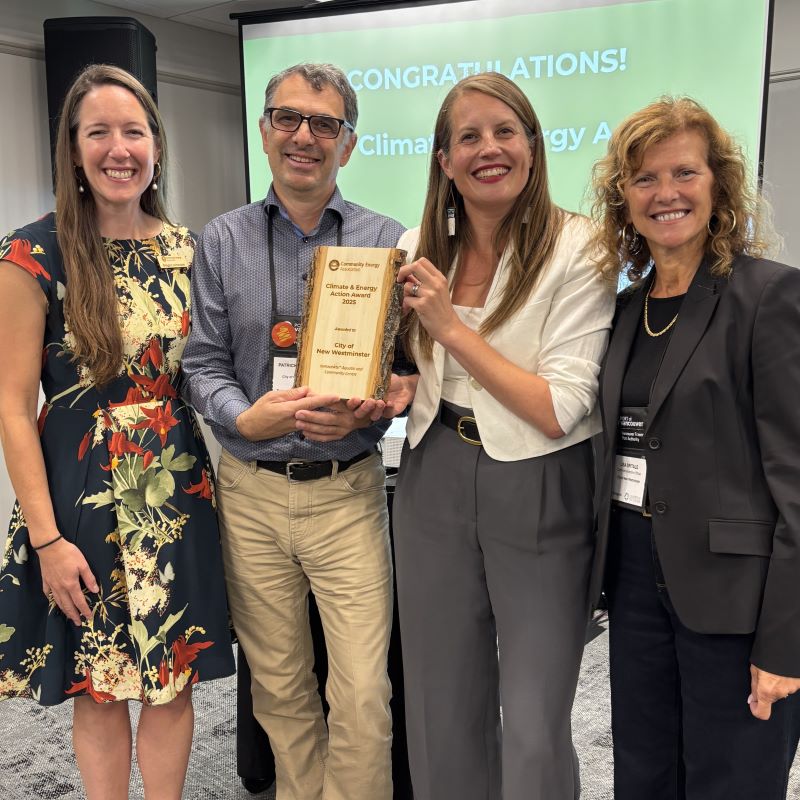If you follow my social media, you might note I was at UBCM last week. The Union of BC Municipalities is the annual conference/convention for local government leaders from across the province, and as you can see here, here, and here, I like to report out on events I attend on behalf of the City, and give some updates about the City’s advocacy to the Province.
By its nature, UBCM is political, but I am going to avoid some of the more pointed politics of the event here, and hold those for my Newsletter (subscribe here – its free), and try as best I can to stick to the facts and summarize a week as concisely as possible. Still, you might want to warm up your tea, because this is a longish one.
It is worth, at the start, talking about the tone of the meeting. I was at UBCM events in the waning days of the BC Liberal government where local governments were feeling very ignored by the province, and anger was stewing. I was also there when a new BC NDP government came in and Selena Robinson (one of us!) was the Minister responsible for local government and it was a love-in. There is no doubt the shine is off the apple a bit for the BC NDP, and it would be fair to expect a chilly tone at UBCM, but that was not the feeling in the rooms in Victoria even if there were protesters and an ongoing BCGEU strike at the front door off the meeting. Workshops and roundtables with Ministers from the government were generally friendly and David Eby got a decent reception (with a standing ovation) of his speech.
A big part of UBCM are the Learning Sessions, the opportunity for learning through panel discussions, workshops, townhalls, and information sessions. Here are the ones I attended:
Climate Hazards and Housing: we learned about the impacts of climate disruption, with emphasis on the retreat and recover response in Merritt to their atmospheric river flood (with lots of support from the province while the federal government have been shamefully absent), and the ongoing challenges an uncertainties still impacting largely rural Fraser Valley communities as a result of the same flood event. The big take-away from this was the presentation from the Insurance Bureau of Canada explaining how climate-related insurance losses in 2024 exceeded $9 Billion: three times the average over the last decade, and ten times the average form a decade before. You may or not believe that Climate Disruption is a thing, but the Insurance Bureau has the receipts, and your insurance rates tripling in the next few years is a possible outcome of our keeping our national head in the sand about this. But I guess one more pipeline will help pay for this?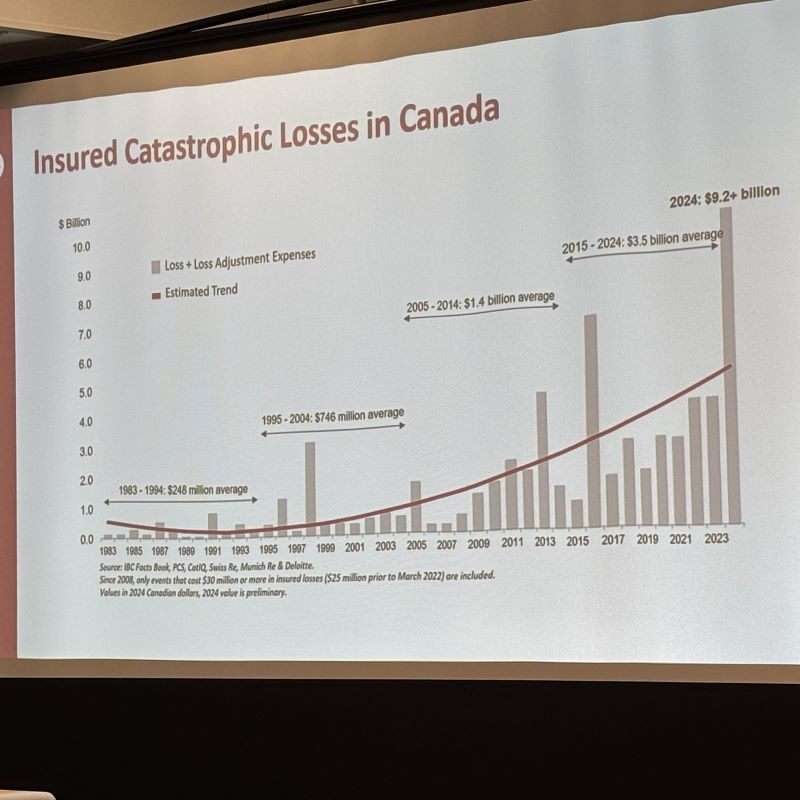
Disordered Downtown: Rethinking Care for Those in Need: This was a session that got a lot of media attention, but was also an example of how media narrative shapes community impressions, because the lengthy discussion about needing massive health care investments because people are being harmed every day did not make the headlines, a Mayors comment about “compassion fatigue” and “law and order” did.
FIFA World Cup 2026 (FWC26) – Community Opportunities: The province is working with local governments to provide opportunities to activate our communities through next year’s World Cup games in Vancouver. This is the most watched sporting event in the worl, bigger than the Olympics by far, and clearly the larger community loves the event, but it is also a FIFA property that comes with a bunch of challenges, such as top-down control over marketing (we cannot, in New Westminster use the words World Cup or FIFA in any way promoting our events, we also can’t use outside sponsors for our events unless approved by FIFA) to strict control over the actual media (We cannot hold large public watch parties without TSN/CTV approval – and that approval comes at a cost). There is a lot to work out here before next summer.
Cowichan Tribes Aboriginal Title Court Decision: Implications for Local Governments
This was the most interesting panel discussion of the event for me. The implications of the Cowichan decision are not yet fully known (and there will be several appeals), but it is clear that this is a very important ruling, but not the panic time that the conservative pundits are claiming. The case was very specific to the lands it covered (clearly illegally sold out from under the Cowichan by Colonel Moody, acquired by the City of Richmond under tax sale) that is not broadly applicable to privately owned fee simple lands, but the negotiations ahead for the Province will represent a new phase of reconciliation in BC.
Modest Growth & Big Challenges: The Road Ahead for BC’s Economy
This panel conversation started with an update on the Provincial economy from the Minister of Finance and some economist guy to unpack the information for a more general audience. Our deficit is notably high and our debt is creeping up, but compared to GDP we have fairly low debt compared to every other province and the cost of borrowing is not yet a big concern – but it might be if we keep on this trend. The conversation was wide-reaching about our strengths (relatively buffered against US trad weirdness) and challenges (the sudden stop in immigration growth means we are technically in a per-capita recession). The big takeaway was that the economist on the panel (and the CCPA economist who as not invited to this) both disagreed with the Business Council guy on the panel – we are not in a spending crisis, we are in a revenue crisis. Nonetheless, the “we have no money” theme was repeated all weekend.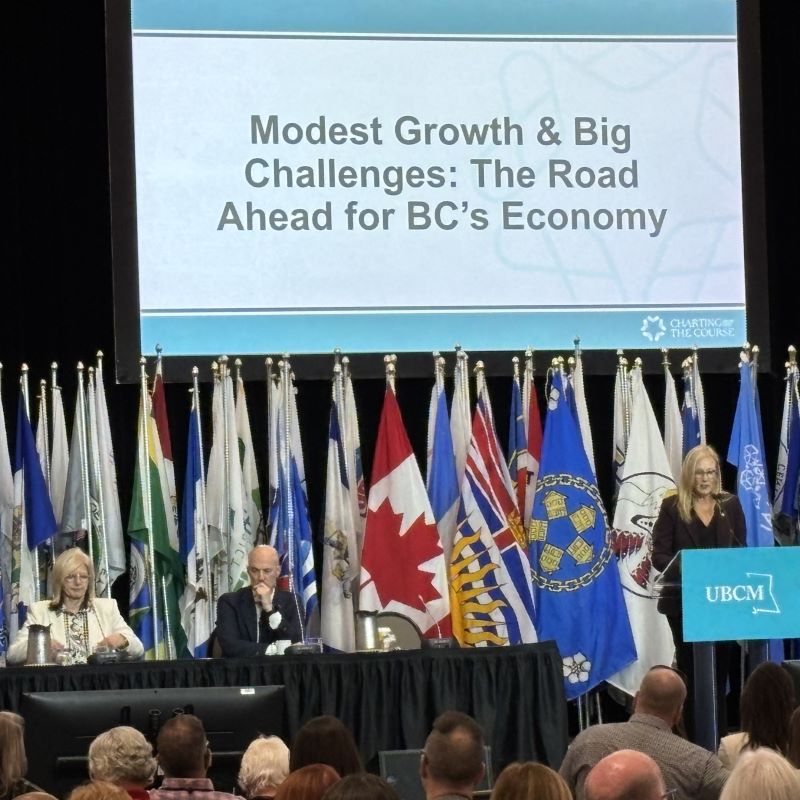
Cabinet Town Hall: Strong Communities: This Town Hall was just that, local government folks asking questions of three key ministers: Housing and Municipal affairs, Health, and Transportation. It was a broad conversation, including Tasha Henderson pushing Minister Boyle and bout school funding in New West – and how schools need to be art of the housing policy now. It is also interesting to hear similarities and difference across the province about the biggest issues ot put in front of Ministers while you have them cornered, and a healthy reminder that we in the Coast have good access to Ministers, but for much of the province this is their one time a year to get face time with important provincial decision makers.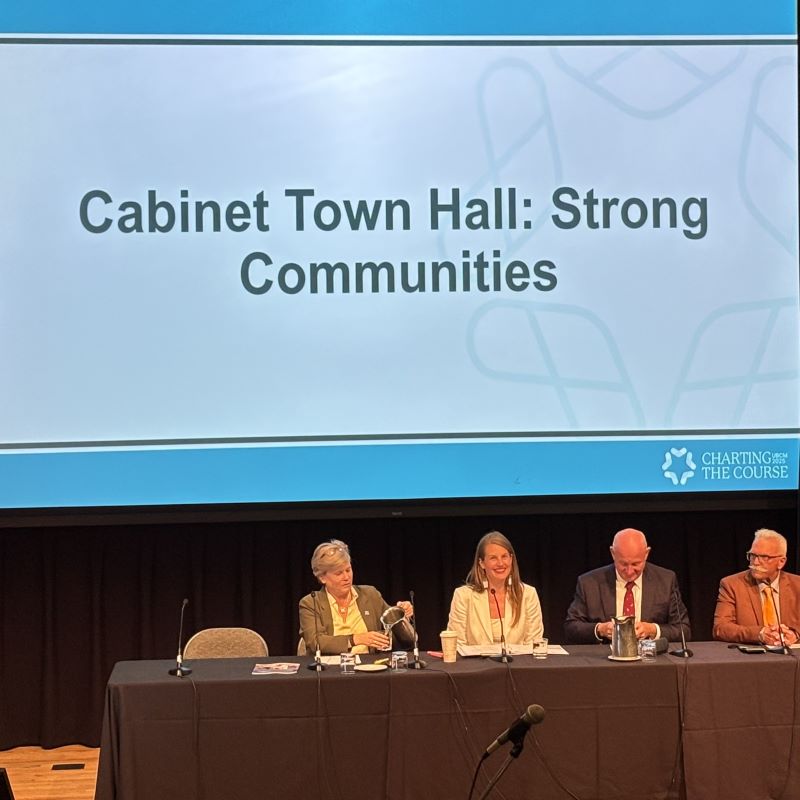
On that topic, we had Council-to-Minister meetings with Minister Kang (on funding challenges for local festival and community organizations, and FIFA World Cup opportunities), Ministers Kahlon and Bailey (on support for local small business, including giving local governments more tools to address some local challenges), Minister Boyle (updating her on our Housing targets, on our financing growth model and infrastructure costs, our OCP update approach, and our need for more investment in affordable housing), and Minister Parmar (on some reconciliation and land use issues in the community). I also had a good meeting with BC Hydro folks in my role on the Electrical Commission to talk about partnership opportunities for infrastructure and climate action.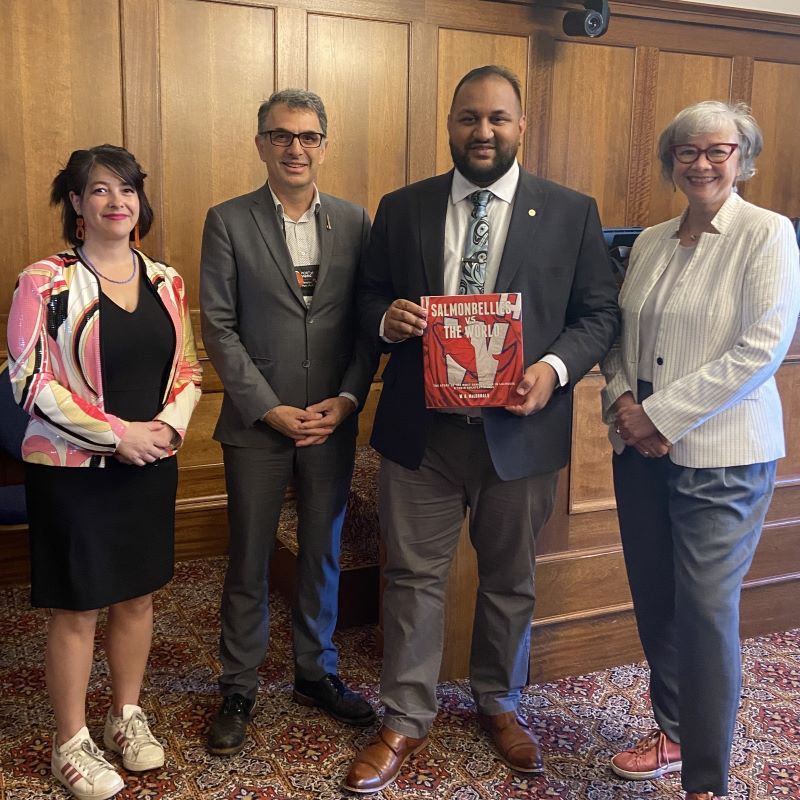
The message almost across the board – to the point where it was the theme of the week – was “we don’t have money right now”. Working with the City’s Intergovernmental Relations team, we knew that was coming, so pivoted much of our our advocy to include the many non-monetary supports that we would like to work towards, such as regulatory and legislative changes to meet common goals, which I think landed really well in several of these meetings.
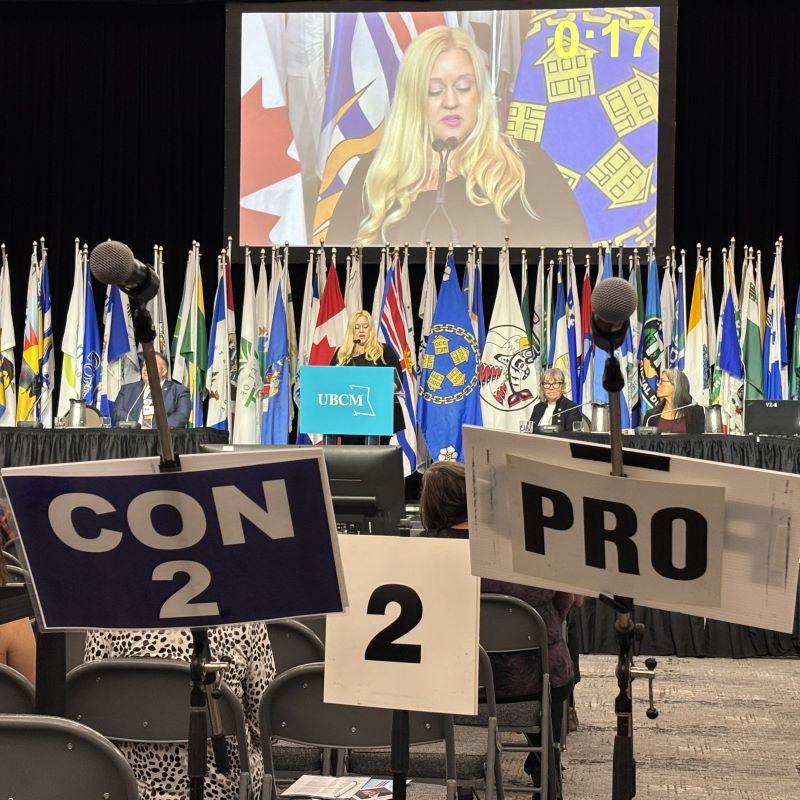
Finally, there was a lengthy Resolutions Session where the assembled membership of the UBCM decide on common advocacy goals. There were ~275 resolutions on the agenda, and managed to get through (by my count) 168 of them. New Westminster Council was well represented in the discussions of the resolution, with Councillors Campbell, Henderson, McEvoy and Nakagawa all actively involved in the debates. New Westminster had two resolutions up for debate, both passed, though in slightly different ways.
NR60 Regulating Vape Shops
Whereas Health Canada has stated that they share the concerns of parents, educators, youth and public stakeholders regarding the increase of youth vaping in Canada;
And whereas the Liquor and Cannabis Regulation Branch oversees provincial liquor and cannabis regulations, including licensing and monitoring of private cannabis retailers:
Therefore be it resolved that UBCM ask that the Province of BC include retail stores used primarily for sale of electronic nicotine or e-cigarettes under the Liquor and Cannabis Regulation Branch and thereby include restrictions that regulate where and how many of these retail stores are able to receive business licences in a community.
The author of the resolution, Tasha Henderson, spoke to the resolution from the floor, and got a solid majority (though not unanimous!) vote of the members.
RR36 Lobbyist Registration Vancouver
Whereas the Government of BC has recognized the potential impact of lobby activities for its public office holders and introduced the Lobbyist Transparency Act to provide the Government of BC legal tools to oversee, monitor and enforce lobbyist activities in pursuit of open, accessible, and accountable government;
And whereas unregulated lobbying activities at the municipal and regional district level can lead to undue influence from special interest individuals, groups, or organizations and BC municipal governments and regional districts are not afforded the same statutory authority to moderate local lobbyist activities:
Therefore be it resolved that UBCM ask that the Government of BC introduce legislative reform that either: (i) enables municipalities and regional districts to use the Office of the Registrar of Lobbyists for BC, or (ii) enables municipal councils and regional district boards to establish, monitor, and enforce lobbyist activities within their jurisdictions parallel to mechanisms available under the Lobbyist Transparency Act.
This resolution along with a similar one from Vancouver was deemed redundant because a nearly identical resolution from the City of Saanich was passed though the Endorsed Block (without any debate), so in the end result, the advocacy is approved by the membership, and we were happy to cede the space to our colleagues in Saanich as long as we got this over the finish line.
As for the rest of the meeting (other than the many networking opportunities), we had speeches from the leaders of all four parties represented in the House, David Eby concentrating on the economy and generally well received (excepting a couple of vocal protesters on Gaza), Rustad turning heads by suggesting he would dissolve a Regional Government because it was getting bad press (bizarrely suggesting it is just a utility company), a new Emily Lowan bringing a message of hope from youth, and Dallas Brodie pining about the good old days when she was a child and there was no crime (and residential schools were still in operation). So yeah, that.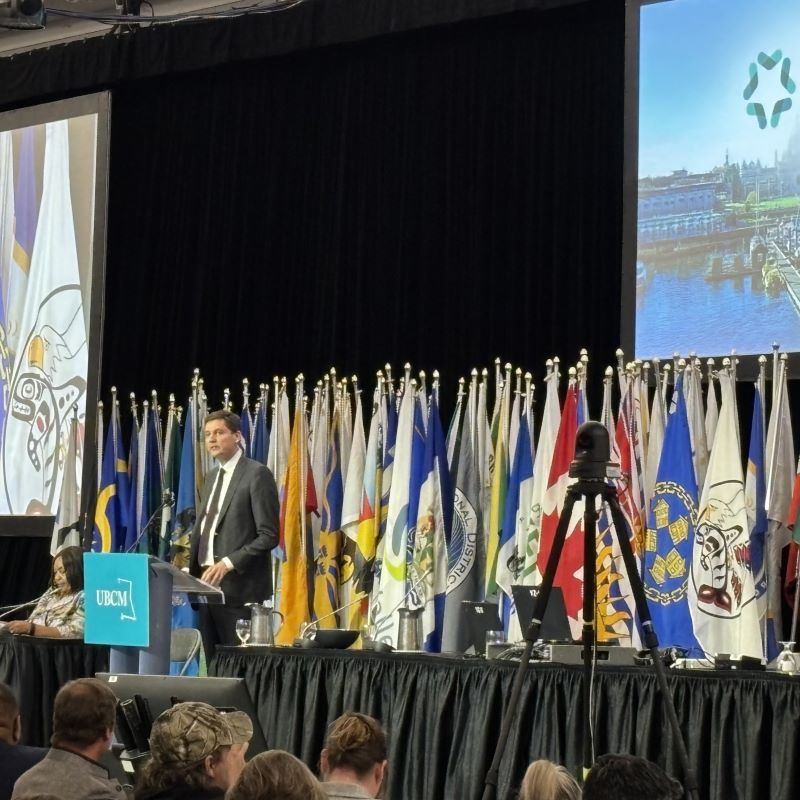
Finally, New Westminster won a Climate & Energy Action Award for building the first zero carbo certified aquatic and recreation centre in BC. Which was a nice way to put a cap on the meeting.
